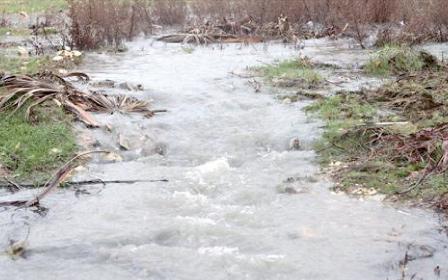You are here
Zarqa residents reel from disruptions in water supply
By Maria Weldali - Dec 02,2019 - Last updated at Dec 07,2019

A recent interruption in water supply in Zarqa was due to murky waters that resulted from the last rainfall, according to Assistant CEO at Miyahuna in Zarqa Jreis Dababna (JT file photo)
AMMAN — Fluctuation in water supply has raised many questions and complaints among Jabal Tareq residents in Zarqa, as recurrent interruption in water has rendered it difficult to cover water and sanitation needs, according to the Jordan Water Company (Miyahuna).
The significant increase in the demand for water, especially with the high level of natural population growth and heavy influxes of refugees, has led the Ministry of Water and Irrigation to develop “comprehensive strategies” to address the interruptions of water in the area, which Miyahuna in Zarqa is responsible for implementing, Assistant CEO at Miyahuna in Zarqa Jreis Dababna told The Jordan Times on Sunday.
"The interruption in water supply was due to murky waters that resulted from the last rainfall and the shortage lasted for two weeks, not three weeks as some have said," Dababna said.
The preventive maintenance programme which was carried out over the entire Disi pipeline is the primary cause for disruption in water supply to some areas of Zarqa and other governorates across the Kingdom, Dababna said, adding that the reason behind the fluctuating supply of water during the past two weeks “was not broken water lines or damaged pipes”.
It is prohibited for owners of water cisterns to “take advantage” of water shortage crises and the Ministry of Industry, Trade and Supply is responsible for taking action on the exploitations that some of the cistern owners have carried out, by including oversight mechanisms and censorship measures, Dababna said.
The “true foundation” of a sustainable solution to the water problem, not only in Zarqa but across the Kingdom, is an awareness of the significance of water, as well as the promotion of water conservation through outreach programmes and major projects, such as desalination and wastewater treatment, the assistant CEO said.
"We have call centres across the country, through which citizens can provide information regarding the problems they are facing with water, and in this way, water cisterns are supplied as necessary and the expenses of the added water is based on water metre prices," he said.
Related Articles
AMMAN — Some 400 experts, entrepreneurs and young journalists from 40 countries will gather in Amman later this month for an international f
The Jordan Water Company (Miyahuna) has announced a new water distribution programme for its 780,000 subscribers in Amman, Zarqa and Mabada, company officials said on Saturday.
AMMAN — The Jordan Water Company (Miyahuna) in Zarqa Governorate is issuing tickets and suspending services to subscribers wasting water, an











